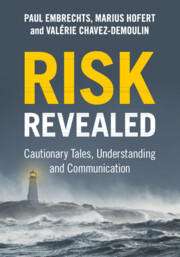Book contents
- Frontmatter
- Dedication
- Contents
- Preface
- Introduction
- 1 The 1953 Great Flood
- 2 The Space Shuttle Challenger Disaster
- 3 The 2007–2008 Financial Crisis
- 4 Earthquakes and Tsunamis
- 5 The L’Aquila Trial and the Public Communication of Risk
- 6 The Coronavirus Pandemic
- 7 Mathematical Wonderland
- 8 Stochastic Modeling
- 9 The Modeling of Extreme Events
- 10 On Climate Change and Related Risk
- 11 Further Examples from the World of Extremes
- 12 Networks
- 13 The Black Tulip and February 3, 1637
- A Note About the References
- References
- Index
11 - Further Examples from the World of Extremes
Published online by Cambridge University Press: 05 April 2024
- Frontmatter
- Dedication
- Contents
- Preface
- Introduction
- 1 The 1953 Great Flood
- 2 The Space Shuttle Challenger Disaster
- 3 The 2007–2008 Financial Crisis
- 4 Earthquakes and Tsunamis
- 5 The L’Aquila Trial and the Public Communication of Risk
- 6 The Coronavirus Pandemic
- 7 Mathematical Wonderland
- 8 Stochastic Modeling
- 9 The Modeling of Extreme Events
- 10 On Climate Change and Related Risk
- 11 Further Examples from the World of Extremes
- 12 Networks
- 13 The Black Tulip and February 3, 1637
- A Note About the References
- References
- Index
Summary
Finding the elixir of life has always been an important quest of humanity. The topic of longevity, hence answering the question about the maximal age attainable (now and in the future) of humans has fascinated civilizations throughout the ages. Starting from the example of the oldest person on record, Jeanne Calmant, we introduce basic statistical techniques from survival (also reliability) analysis in order to study the process of aging from a statistical point of view. Recent findings on the topic are applied to the question of whether there is a plateauing of the hazard rate at high age. We then turn to the important problem of risk communication in the case of hurricanes. In particular, we compare and contrast the two hurricanes Katrina (2005) and Ida (2016) that hit the coast of Florida around New Orleans. Especially in the case of Ida, we comment upon the communication around the risk due to the ensuing flash floods over the northeast coast of the United States. New architectural and city planning initiatives, such as sponge cities, deserve our attention.
Keywords
- Type
- Chapter
- Information
- Risk RevealedCautionary Tales, Understanding and Communication, pp. 316 - 325Publisher: Cambridge University PressPrint publication year: 2024



